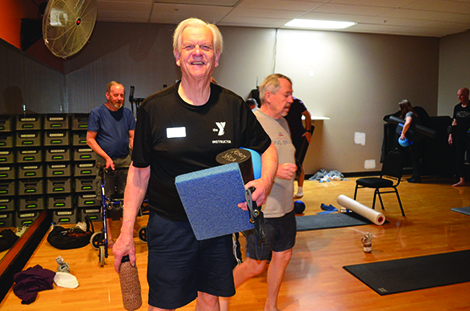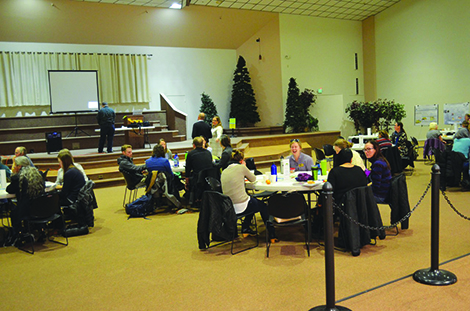Never too old to be strong and fit
Chris Lunn is dedicated to making sure folks of all ages can remain active and healthy throughout their lives.
Lunn is 81 years old, but to watch him in action, you would never know it. He is in great shape himself and passionate about his students.
Years ago, he stumbled upon Pilates to lose some weight and get back into shape.
“My back had gone out and my work required a lot of driving, walking and carrying a heavy backpack, and I joined the YMCA,†he said. It was there during a strength and stability class that Lunn learned slow and methodical movements. When the leader of the class moved on and the class was in danger of being canceled for good, Lunn took over.
“When that happened eight years ago, I told the Y, ‘I can teach that class,’“ he said.
The rest, as they say, is history.
Lunn took over the Strength and Stability class at Korum YMCA in Puyallup and three years ago began leading a class for seniors at Willow Gardens, a nearby retirement community.
The workout at Willows Gardens focuses on better breathing and balance. “We work a lot on balance. A lot can be done to make people’s lives better in a retirement situation,†said Lunn.
Marianne Tobin has been taking Lunn’s class at Willow Gardens for two years.
“I saw my doctor and he gave me an exercise band and told me to use it,†she said.
Classes at Willow Gardens meet twice a week and are free to residents. Lunn begins with a 15-minute warmup and deep breathing, leading the group with lots of gentle guidance and information, always offering bits of encouragement. “Open your chest. That makes you taller,†he said at a recent class.
Participants use bands and remain seated for most of the class. As they progress through their workout, Lunn encourages everyone to go slow for the best results, while always keeping a close eye on the group and emphasizing proper form and safety.
At Korum YMCA, the Strength and Stability class has about 20 participants standing and working on the floor. They know the drill, and as they come in, they put mats on the floor, grab their water bottles and get ready to work.
Ron Smith, a retired Boeing employee, said he has been taking Lunn’s YMCA class for about five years.
“It is a good way to end the week,†Smith said.
Again, Lunn does an excellent job with the YMCA group of explaining what will come next, leading them through their moves, always focusing on form and safety.
Class participants are enthusiastic and grateful for the class and the slow, deliberate movements, and they say they notice a marked improvement in their life with regular attendance.
Valerie True, a nurse who works two 12-hour shifts a week, finds the class helps her with aches and pains after the long workdays.
“I’ve been coming for two months, and it has really helped my back,†she said.
Strength and Stability meets at Korum YMCA every Friday from 11:50 a.m. to 12:30 p.m.
Lunn leads a busy life, focusing on seniors staying active through his classes. Two months ago, he started leading a stretch and stability class at Metro Parks Tacoma’s new Eastside Community Center on Thursdays at 11:30 a.m.
He also has a background in music. In 1969, he founded Victory Music, a non-profit music-education organization that offers open-mic sessions and other showcases and workshops for musicians. It started in Bonney Lake and now is based in Seattle.
Joan Cronk, who wrote this article, is a freelance writer from Puyallup.



